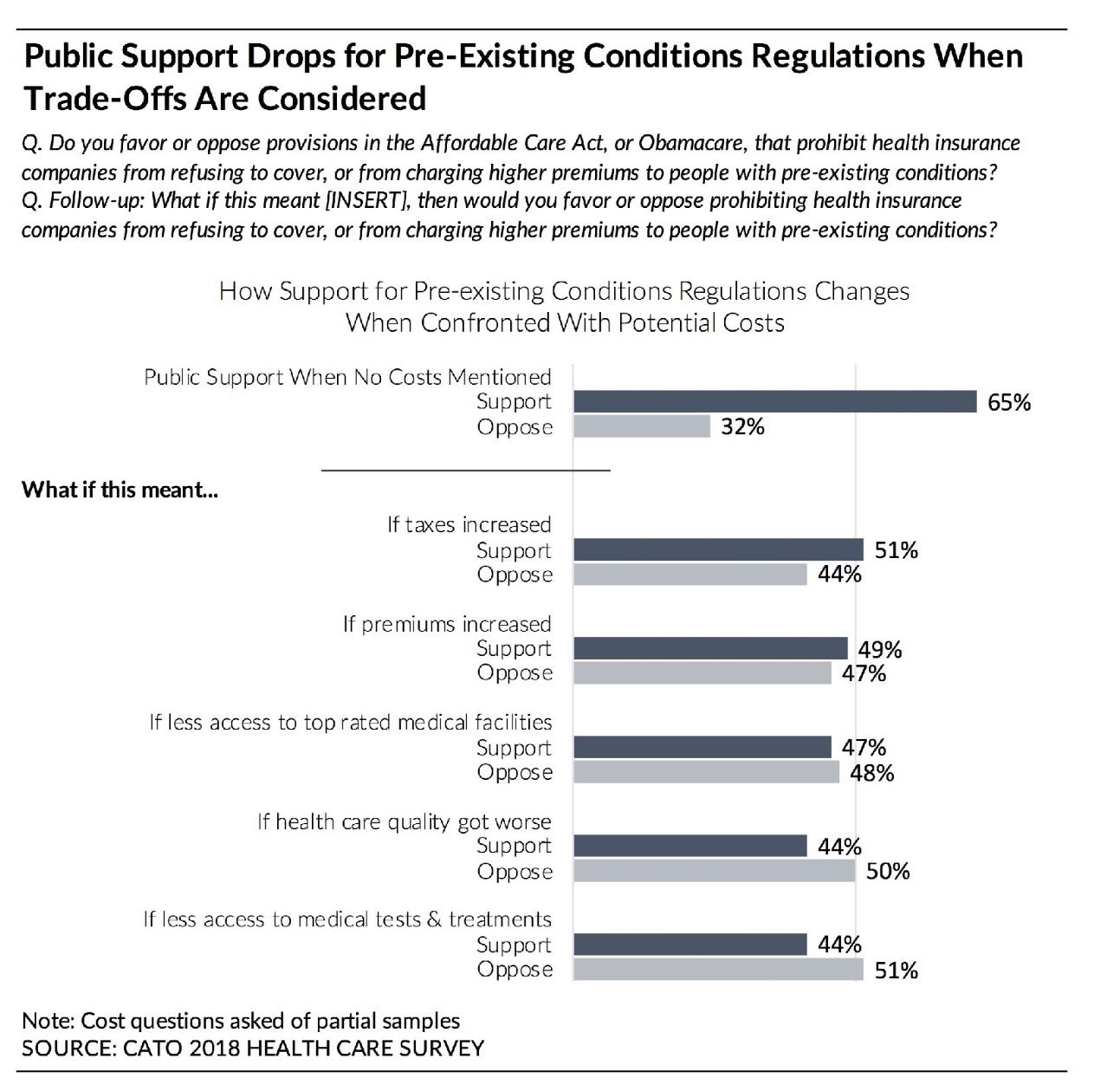Poll: People Care MORE About Rising Costs Than Pre-Existing Conditions
Now they tell us! A Gallup poll, conducted last month to coincide with the midterm elections and released on Tuesday, demonstrated what I had posited for much of the summer: Individuals care more about rising health insurance premiums than coverage of pre-existing condition protections.
Of course, liberal think tanks and the media had no interest in promoting this narrative, posing misleading and one-sided polling questions to conclude that individuals liked Obamacare’s pre-existing condition “protections,” without simultaneously asking whether people liked the cost of those provisions.
Overwhelming Concern about Premiums
Ironically, a majority of 57 percent said the denial of coverage for pre-existing conditions did not constitute a major concern for them, with only 42 percent agreeing with the statement. Lest one believe that the relative insouciance over pre-existing conditions came because Democrats won a majority in the House, therefore “protecting” Obamacare, Gallup conducted the survey from November 1–11, meaning more than half the survey period came before the American people knew the election outcome.
By comparison, more than three-fifths (61 percent) of respondents viewed rising premiums as a major concern, with only 37 percent not viewing it as such. Not only did premiums register as a bigger concern by 19 percentage points overall, it registered as a larger concern in each and every demographic group Gallup surveyed:
Income under $30,000: +15 percent (70 percent said premiums were a major concern, 55 percent said pre-existing condition coverage was a major concern)
Income between $30,000-$75,000: +19 percent (63 percent premiums, 44 percent pre-ex)
Income above $75,000: +24 percent (57 percent premiums, 33 percent pre-ex)
On Medicare/Medicaid: +16 percent (60 percent premiums, 44 percent pre-ex)
On private insurance: +24 percent (60 percent premiums, 36 percent pre-ex)
Republicans: +25 percent (52 percent premiums, 27 percent pre-ex)
Independents: +19 percent (64 percent premiums, 45 percent pre-ex)
Democrats: +16 percent (68 percent premiums, 52 percent pre-ex)
Aged 18-29: +16 percent (54 percent premiums, 38 percent pre-ex)
Aged 30-49: +23 percent (65 percent premiums, 42 percent pre-ex)
Aged 50-64: +21 percent (67 percent premiums, 46 percent pre-ex)
Aged over 65: +13 percent (57 percent premiums, 44 percent pre-ex)
Men: +18 percent (56 percent premiums, 38 percent pre-ex)
Women: +20 percent (67 percent premiums, 47 percent pre-ex)
With those double-digit margins (i.e., outside the poll’s margin of error) in every demographic group—including among groups more likely concerned about pre-existing conditions, for reasons either practical (i.e., older Americans) or ideological (i.e., Democrats)—Gallup has overwhelming evidence to support its claim that “concerns are greatest about the possibility of having to pay higher premiums.”
Premiums more than doubled from 2013 to 2017, as the law’s major provisions, including the pre-existing condition requirements, took effect. They again rose sharply in 2018, causing approximately 2.5 million individuals to drop their Obamacare-compliant coverage completely.
Not a Surprise Outcome
The Gallup results confirm prior surveys from the Cato Institute, which also demonstrate that support for Obamacare’s pre-existing condition provisions drops dramatically once people recognize the trade-offs—namely, higher premiums and a “race to the bottom” among insurers, reducing access to specialist providers and lowering the quality of care:

But the polling suggests that Democrats have no such mandate, and that they should think again in their approach. Rather than making an already bad situation worse, and potentially raising premiums yet again, they should examine alternatives that can solve the pre-existing condition problem (and yes, it is a problem) by making it easier for people to buy coverage before they develop a pre-existing condition in the first place.
As the polling indicates, the American people—to say nothing of the 2.5 million priced out of the marketplace in the past 12 months—will thank them for doing so.
This post was originally published at The Federalist.